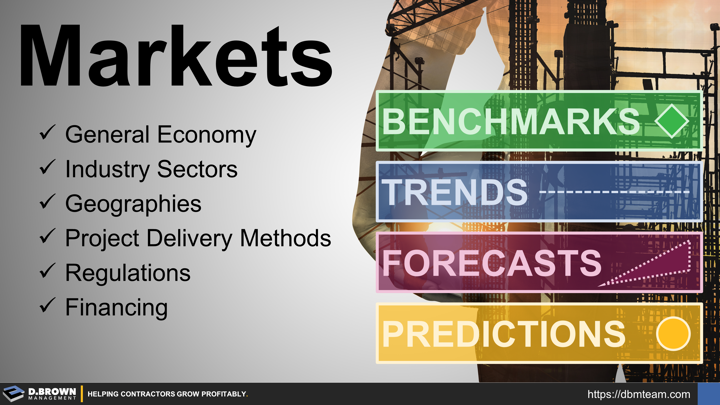This is not meant to be a complete list but rather a starting point as you develop your own information systems both internally and externally to support strategic decisions and major resource allocations.
General Resources - A Starting Point
- FMI Construction Outlook: General reports updated quarterly and more tailored information available for a fee.
- AGC Construction Data: A wealth of information including fact sheets by state, economic forecasts and Data DIGest with weekly updates on the latest economic news relevant to the construction industry including commentary from their Chief Economist, Ken Simonson.
- Dodge Construction Network: A large source of information from broader industry forecasts through specific project opportunities.
- IBISWorld: Market research tailored for a wide range of roles (use cases), market sectors, and specific industries in the United States and around the world.
- AIA Architecture Billings Index (ABI): Leading indicator of changes that will ultimately impact construction work.
- ENR Construction Cost Index: Details on the major drivers of construction costs.
- US Census Bureau (Construction Spending): Variety of data tables and trend charts on the construction industry as a whole.
Specifics - Localized, Industry, and Customer Specific
As you dive deeper into specific industry sectors and geographies, there are numerous other sources. Some to look into are:
- Following the economic development activities in the geographies you compete in through local Planning Commissions, Zoning Boards, City Council meetings, Real Estate Councils (example - Houston Real Estate Council), Chambers of Commerce, Economic Development Councils (example - Greater Phoenix Economic Council), and Business Journals.
- Joining and actively participating in the industry associations for the project owners you build for, or want to be building for. For example, contractor organizations like AGC (Associated General Contractors) and ABC (Associated Builders and Contractors) as well as organizations serving project owners like ASHE (American Society for Healthcare Engineering).
- County, City, and Higher Education procurement channels.
- Companies that track bond programs across a state.
- Building permit data for your area.
- Companies that track specific markets and have deep expertise in them. For example, in the energy infrastructure market there is C Three Group, IBISWorld (also tracks other industries), Mercom Capital, and EPRI.
- All of the large consulting firms like Bain & Company, Deloitte, McKinsey & Company, etc. have their own analysis and market research available for a fee. Depending on what market(s) you are investigating and where your company is at in its stage of growth, these can be valuable resources.
- Larger firms in insurance and surety such as Lockton have industry outlook reports and meetings.
- Developing a network of people who can provide insights into the market(s) your company is involved in. The military refers to this as HUMINT (Human Intelligence) and may include people that are analysts covering various industries, RIET (Real Estate Investment Trust) executives, Think Tank (example - ISPE International Society for Pharmaceutical Engineering) executives, brokers, Real Estate Attorneys, Civil Engineers, etc. Develop a systematic rhythm for connecting with them a couple times per year, what information you gather from them, and how you correlate all the information to help make decisions.
- Systematically talking to your customers to understand what information they look at to make decisions for their building programs and projects. For example, how are major project owners like Marriott, Ford, or Intel forecasting their demand.
Project Delivery Methods and Trends
- Public-Private Partnership (P3) Trends: Husch Blackwell is a large law firm and has published a report from 2022 on the trends in P3s for project financing.
- Project Delivery Trends: ConsensusDocs and Fox Rothschild LLP, one of the largest construction law firms in the US provide a quick summary of project delivery trends in 2023 which you can see reflected in the ENR Top 400.
We will continually update this list but it isn't practical or helpful to have an exhaustive list as it would be information overload. Please contact us to schedule time to talk about the specifics of your company, your current information decisions, and the decisions you are working to make. We will openly share anything we can to help.

